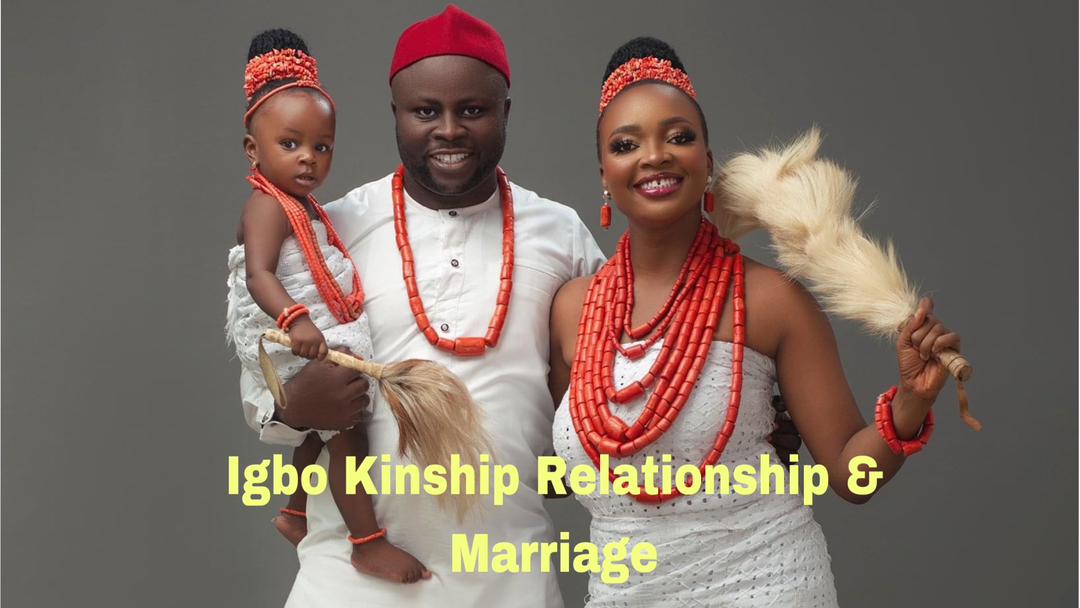
How Igbo Kinship Relationship Affects Marriage
Among the Igbo speaking people of the western Niger, known as Enuani people,
predominantly in Delta State, Nigeria, kinship relationship is regarded as very sacred.
It is upon the tenets of kinship that marriage is contracted whether in ancient or
contemporary society.
The people hold such relationships with very high regard. Family is family and there is no
such word as half-brother or extended family.
Also, all male relatives are regarded as "nwanne" brother as well as all female relatives are
regarded as sister.
Genrally, there are two main types of kinship relationship recognized in Ubulu-Uku Kingdom
- Affinity kinship relationship
- Consanguinity kinship relationship
1. AFFINITY KINSHIP RELATIONSHIP
This relationship is brought about by marriage between two families. They maintain a cordial
social relationship as "Ọgọ" In-laws. The lineages involved can intermarry.
However, the offspring of the immediate family who are in a marital union with the other
lineage cannot intermarry. No family from the entire lineage where the wife is married from
can marry any of her offspring. This culture is maintained till the next F3, third filial
generation.
2. CONSANGUINITY KINSHIP RELATIONSHIP
This relationship results from birth. It is a blood relationship that is taken very sacrosanct in
Ubulu Culture. Relationship by birth is viewed from four different parental genetic pedigrees.
“Ebo anọ we si abia enu” the four lineages of birth. But in general, the birth of a child can be
traced to about seven parental genetic blood lines. Marital relationship is not permitted
among natives who are related by consanguinity, unless it has passed F3, the third filial
generation, which is referred in Ubulu language as “Ụkwata Atọ”.
Below are the parental pedigrees according to their order of importance.
THE PATRILINEAL (EBO’E NADI)
This is the child’s paternal lineage, the lineage where the child is born into. Here, the child is
entitled to an inheritance as patrimony. The child will not go into any marital or sexual
relationship with any member of this lineage or any other lineage who are led by the same
“ọfọ” traditional staff of authority, with his lineage. Neither will the child be allowed to have
any marital or sexual relationship with the children, grandchildren or great grandchildren of
any woman married from that lineage to another lineage.
Also, if the child is male, he will lead the lineage as Diokpa by gerontocracy, if he lives old
enough. If the child is female, she will lead the female folks as Ada, by gerontocracy.
Note that; if the child is born to an idegbe, or Nwunye Okposho, that child is considered to be
in his/her patrilineal home. An idegbe is a woman who was kept at home because her father
had not a male child. She would seek a partner and raise children in her father’s name. Her
children will all be regarded as fully born into the lineage.
MATRILINEAL (EBO’E NEE)
This is the lineage where the mother of the child was married from. The lineage is nearly as
important as the patrilineal. If the patrilineal home is unfavorable, the child can return to this
lineage and be welcomed to live among them. There will not be any sexual or marital
relationship between such person and anyone related to via the matrilineal as we have
discussed in the patrilineal.
If the child is male, he will not be allowed to lead the lineage by gerontocracy. He will be
preceded by four men younger than his age. This also is applicable to when the sex of the
child is female. This is so because such people are said to inhabit in their left hand.
THE PATERNAL GRANDMOTHER (EBO’E NEE NADI)
This is the lineage where the paternal grandmother was married from. There will not be
allowed any sexual or marital relationship between the child and anyone related to that
lineage by less than two traceable generations and all the lineages which are under the
same offor as them. The child can live with such people but will have no inheritance among
them.
THE MATERNAL GRANDMOTHER (EBO NEE NNE)
This is the lineage where the maternal grandmother was married from. The child will not be
allowed to have any sexual or marital union with anyone related to that family by one
generation. It is rare but that person can live in this kindred. There will not be any inheritance
for him/her among them.
These are the four basic lineages to be considered as “Ebo Anọ we si abia enu” the four filial
generations of life.
Other lineages not mentioned are; Paternal grandfather's mothers’ lineage and matrilineal
grandfathers’s mother's lineage. These ones are beyond the recognized four and can be
severed to allow marital relationship.
How can consanguinity relationship be severed?
To be continued...


